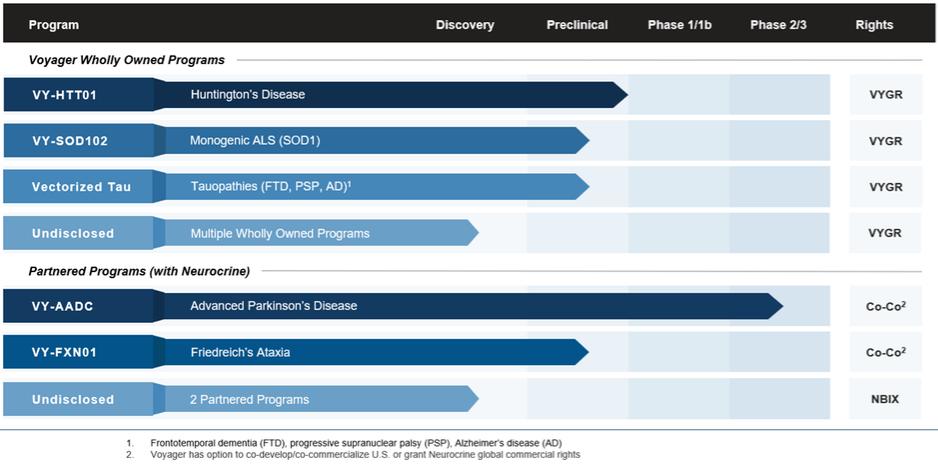We face significant competition in an environment of rapid technological change and the possibility that our competitors may achieve regulatory approval before us or develop therapies that are more advanced or effective than ours, which may harm our business and financial condition, and our ability to successfully market or commercialize our product candidates.
The biopharmaceutical industry is characterized by intense and dynamic competition to develop new technologies and proprietary therapies. Any product candidates that we successfully develop into products and commercialize may compete with existing therapies and new therapies that may become available in the future. While we believe that our gene therapy platform, product programs, product candidates and scientific expertise in the fields of gene therapy and neuroscience provide us with competitive advantages, we face potential competition from various sources, including larger and better-funded pharmaceutical, specialty pharmaceutical and biotechnology companies, as well as from academic institutions, governmental agencies and public and private research institutions.
We are aware of several companies focused on developing AAV gene therapies in various indications, including AAVANTIBio, Inc., Abeona Therapeutics, Inc., Adverum Biotechnologies, Inc., Aevitas Therapeutics, Inc., Amicus Therapeutics, Inc., Apic Bio, Inc., Applied Genetic Technologies Corporation, Asklepios BioPharmaceutical, Inc., Audentes Therapeutics, Inc. (acquired by Astellas), Axovant Sciences Ltd., or Axovant, Biogen, Inc., or Biogen, Brain Neurotherapy Bio, Inc., Encoded Therapeutics, Inc., GenSight Biologics SA, Homology Medicines, Inc., LogicBio Therapeutics, Inc., Lysogene SA, MeiraGTx Ltd., or MeiraGTx, Neurogene, Inc., Novartis Gene Therapies, Passage Bio, Inc., Pfizer, Inc., Prevail Therapeutics, Inc., PTC Therapeutics, Inc., REGENXBio Inc., Sarepta Therapeutics, Inc., Solid Biosciences, Inc., Spark, StrideBio, Inc., Taysha Gene Therapies, Inc. and uniQure, as well as several companies addressing other methods for modifying genes and regulating gene expression. Any advances in gene therapy technology made by a competitor may be used to develop therapies that could compete against any of our product candidates.
We expect that VY-AADC (NBIb-1817) will compete with a variety of therapies currently marketed and in development for Parkinson’s disease, including DBS marketed by Medtronic plc, Abbott Laboratories (acquired from St. Jude Medical in 2017), and other medical device companies, DUOPA/Duodopa marketed by AbbVie, as well as other novel, non-oral forms of levodopa, including Mitsubishi Tanabe Pharma’s ND0612 (acquired from NeuroDerm in 2017), Acorda Therapeutics’ inhaled levodopa, INBRIJA, and Sunovion Pharmaceuticals’, or Sunovion’s, sublingual apomorphine, KYNMOBI. Gene therapy competition for Parkinson’s disease includes AAV2-GDNF being developed by Brain Neurotherapy Bio, Inc. and AAV-GAD being developed by MeiraGTx Axovant is developing a second generation LentiVector gene therapy, AXO-Lenti-PD (previously OXB-102, licensed from Oxford Biomedica in 2018).
We expect that our preclinical programs will compete with a variety of therapies in development, including:
| ● | VY-HTT01 for Huntington’s disease will potentially compete with RG6042 (IONIS-HTTRx) being developed by Roche in collaboration with Ionis Pharmaceuticals, Inc., or Ionis, WVE-120101 and WVE-120102 being developed by WAVE Life Sciences Ltd. in collaboration with Takeda Pharmaceutical Company Limited, or Takeda, a Zinc Finger Protein (ZFP) therapy being developed by Sangamo Therapeutics,��Inc. in collaboration with Shire plc, and gene therapies being developed by uniQure and Spark; |
| ● | VY-SOD102 for a monogenic form of ALS will potentially compete with BIIB067 (IONIS-SOD1Rx) being developed by Biogen, in collaboration with Ionis, and gene therapies being developed by AveXis and Apic Bio, Inc.;VY-FXN01 for Friedreich’s ataxia will potentially compete with AAV gene therapies being developed by Pfizer, Inc., PTC Therapeutics, Inc., StrideBio, Inc. in collaboration with Takeda, AAVANTIBio, Inc., and AveXis; |
| ● | Our Tau program for tauopathies including Alzheimer’s disease, progressive supranuclear palsy, and frontotemporal dementia will potentially compete with tau antibodies being developed by Roche Genentech Inc. in collaboration with AC Immune SA, Eli Lilly & Co., AbbVie, Biogen, and several other companies, as well as an antisense oligonucleotide program being developed by Ionis in collaboration with Biogen; and |
